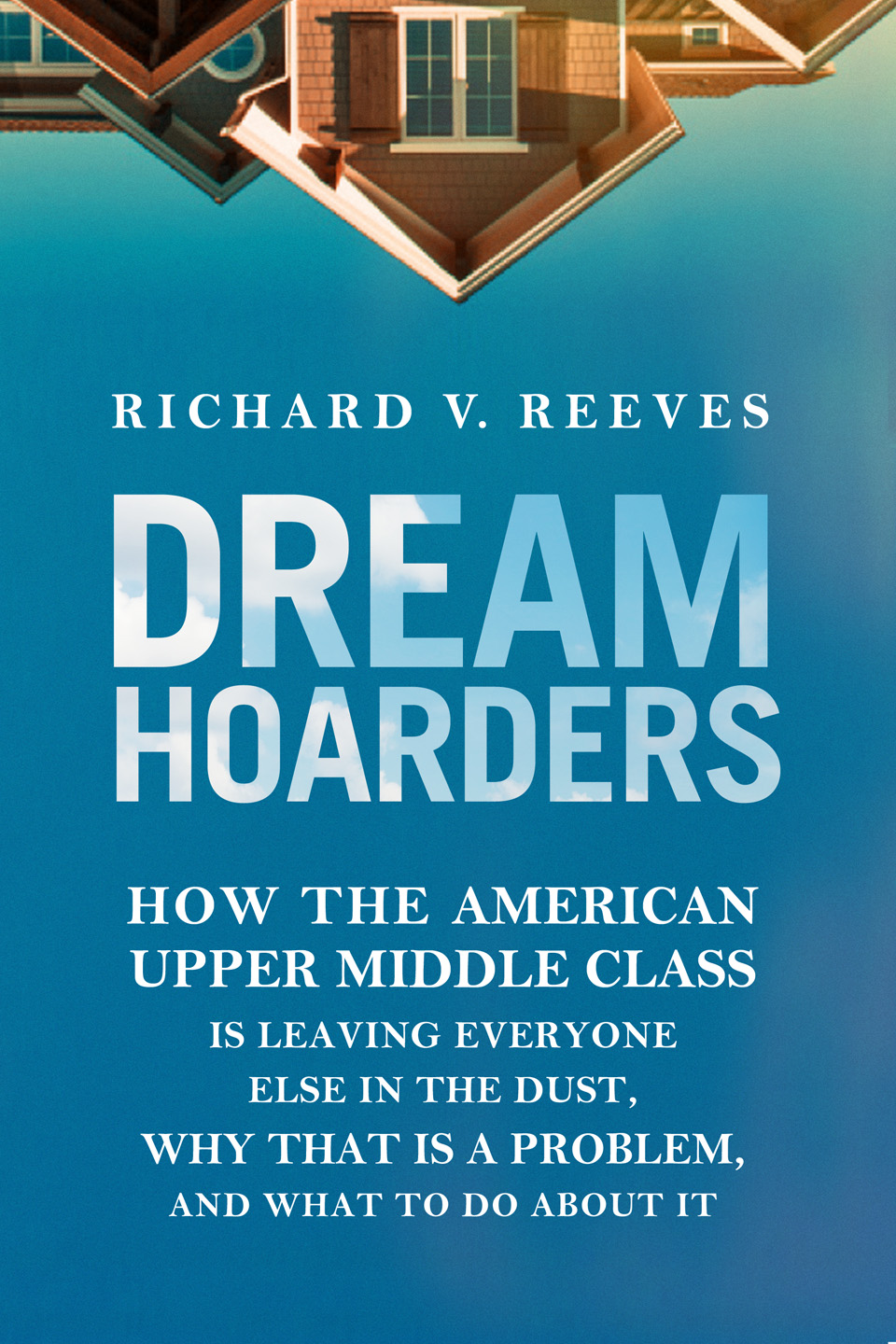A University of Oxford-educated economist and co-director of the Center on Children and Families at the Brookings Institution, Richard Reeves has about as strong a grip on reality as anyone who works with large data sets for a living.
Yet even Reeves found himself clinging to tired clichés when he moved to the United States in 2012. The U.S., he had been raised to believe, was a land of equal opportunity, where anyone, regardless of their parents’ income level, could achieve the American Dream.
But, upon coming to the U.S., that wasn’t the country Reeves found. He saw, instead, a place crippled with a class structure every bit as rigid as the United Kingdom’s, and an upper middle class increasingly focused more on their own children’s success than betterment of the world they live in.
The U.S., in other words, had fallen prey to the very thing it rebelled against in the first place: an immutable aristocracy.
In his new book, Dream Hoarders: How the American Upper Middle Class Is Leaving Everyone Else in the Dust, Why That Is a Problem, and What to Do About It, Reeves explores the divide between the top 20 percent of Americans—who have benefited from a modern economy that rewards education and human capital—and everyone else. Upper-middle-class families, he writes, aren’t just distinguished by their high incomes; they’re also distinguished by higher levels of education, lower rates of non-marital childbearing, more stable family structures, and more intensive parenting practices.
These factors all add up to provide enormous advantages to these families, particularly the children. And while many of these practices, far from being unethical, are precisely the kinds of behaviors policymakers should encourage all parents to exhibit, Reeves highlights three specific ways in which he believes that upper-middle-class families are unethically and unfairly “rigging the market” in favor of their own progeny: exclusionary zoning practices, unfair practices around college admissions (including legacy policies), and an internship process that rewards well-connected children.
Reeves’ book proposes a number of reforms that could return America to a country of equal opportunity. Some of those reforms, like providing better access to child-rearing programs for low-income parents, are designed to level the socioeconomic playing field. Others, such as the elimination of legacy preferences in college admissions, would require upper-middle-class Americans to, in Reeves’ words, “make some modest sacrifices in order to expand opportunities for others.”
Reeves chatted with Pacific Standard about his new book, our society’s misguided focus on the top 1 percent of earners, and the need for wealthy Americans to come to terms with the fact that their success may have more to do with inherited privilege than with merit.

You make the argument in this book that our attention on the top 1 percent is misguided, and that we really need to focus on the top 20 percent of the income distribution, the “dream hoarders.” Why is that?
So this is based on my reading of the data, which I think is shared by most, that there hasn’t really been much increase in income inequality within the bottom 80 percent. The action seems to start at about that 80/20 break—that’s where you start to see some of the real income growth and the separation over the last couple decades. The further you go up that 20 percent, the more you see it, but if you’re kind of looking for a moment, that point in the distribution where you start to see the stretch, it’s right about there.
Tell me about the two big economic factors that are driving this economic separation—you refer to them as “wages and wives”?
Higher earnings toward the top of earnings distribution is driven, in part, by the relatively higher earnings of those with more education, in particular college graduates. Just the mere fact that college graduates are earning more would probably be pulling that top 20 percent away.

But then compounding that inequality is the fact that seven in 10 college graduates marry other college graduates. And we’re seeing a huge increase in women’s labor force participation and a massive increase in their amount of education. So what’s happening now is we’re doubling down on the advantages of a college education by increasingly combining two college educated people into the same house and the same family. Which means that there’s two potential relatively high earners in those households. They’re education powerhouses that therefore become economic powerhouses.
You also identify “opportunity hoarding” mechanisms you claim are driving economic separation. You identify three of them: exclusionary zoning practices, unfair college admissions policies, and unfair internship processes. Zoning seems to to be an issue where people are unaware of the long-term consequences of their actions; lots of liberals say they care deeply about inequality but vote against the kinds of zoning policies that would facilitate reductions in inequality. What are the effects of these exclusionary zoning practices?
Zoning and land use regulation is a really important factor in American inequality today. It’s a virtuous circle for those of us on the right side of it, and a vicious circle for everybody else.
Here’s the virtuous circle: I’ve got an expensive house, in a nice neighborhood. I get a massive tax subsidy from the federal government for this. The neighborhood, because it’s expensive, adds zoning so that it remains expensive, saying the neighborhood can have only single-family homes, or by imposing various types of other regulations, which protects the value of those homes. And then what we’ll do is organize our education system such that schools draw from a geographically bounded area, which means that the school I’ll send my kids to is going to be dominated by upper-middle-class kids, which obviously will drive up the performance of that school. Then the good school becomes part of the way you sell the neighborhood, which drives the house price up, which increases the extent to which I get a mortgage subsidy.
What you end up with is an effectively gated community, just with invisible gates. And zoning laws act as invisible gates of the growing number of gated communities. You create almost a perfect class perpetuation machine. The combination of tax subsidies, onerous land-use regulation, and then a geographically based education system … if you were trying to set out a system to help perpetuate economic inequality, you might end up with something a bit like that.
A point you make in the book, which I think will resonate with a lot of parents in this quintile, is that part of the reason people are engaging in these hoarding behaviors is because of concerns about just how grim things look at the 50th percentile right now. In other words, thanks to factors like automation, trade, wage stagnation, and the skyrocketing cost of higher education, the 50th percentile of the income distribution looks a lot different than it used to. How much of what we’re seeing is caused by these larger economic trends in the U.S.?

(Photo: Brookings Institution Press)
I see a connection between inequality at any given moment in time and the inter-generational motives of parents to stop their kids from being downwardly mobile, to put what I call a glass floor underneath them.
If it looks like a long drop, and it doesn’t look great down there, then parents will be naturally more highly incentivized to do everything they can to prevent that drop from taking place.
The problem then is that then your support for more redistribution, your support for a better safety net, your support for more public goods that would make the fall less painful, actually become weaker. Because you are insuring yourself quite effectively against the risk of your kid becoming downwardly mobile. How many upper-middle-class parents really care about the social safety net? How many of them really think their kids might need it? And the answer’s probably not many because they probably have a reasonably good concept that everything they’re doing will stop their kids being downwardly mobile.
Ironically, the absence of downward mobility might undermine support for the exact kinds of redistributive policies that might make the fall less scary. Inequality and lack of mobility can sort of get locked into this kind of slightly vicious equilibrium, whereby you have less mobility, less support for redistribution, etc.
You do have some ideas for how to fix this vicious circle. Some of these seem non-controversial, such as reducing unintended pregnancy rates, investing in home visits, and paying teachers to teach in poor schools. Let’s talk about the ones that are going to be more controversial: making college funding more equal, dealing with exclusionary zoning, widening the doors of post-secondary education, and opening up internships.
I think moving from a NIMBY [Not In My Back Yard] to YIMBY [Yes, In My Back Yard] mindset is going to be important. And I do think that’s about social norms and culture, and that’s a required mindset change. Right now, very liberal upper-middle-class people can feel quite good over the dinner table about voting to prevent any lower-income housing into their neighborhood, sometimes on kind of B.S. environmental grounds. And I think that needs to change.
But it’s the post-secondary education institution where a lot of the separation takes place, and that whole market is a mess. It’s opaque, it is quite regressive in its impact, and it results in more inequality. The U.S. college system is a class stratifier rather than a great equalizer. And so doing more to address that balance is a big part of the story. The problem is that, precisely because it is so important, because the upper middle-class knows this, they got the memo about human capital, and they will fight very hard to retain every advantage they can.
Legacy practices—it’s interesting to me that that’s one of the things that provokes the strongest reaction. I’ve had professors from private liberal colleges, saying: “Oh, really, I do think you’re overstating, why don’t you just let that one go?”
It’s symbolic to me of a system that’s pretending to be meritocratic. If I can’t persuade you that legacy preferences are an anachronistic, unfair, hereditary mechanism, then I have no hope of convincing you of anything else.
This interview has been edited for length and clarity.




